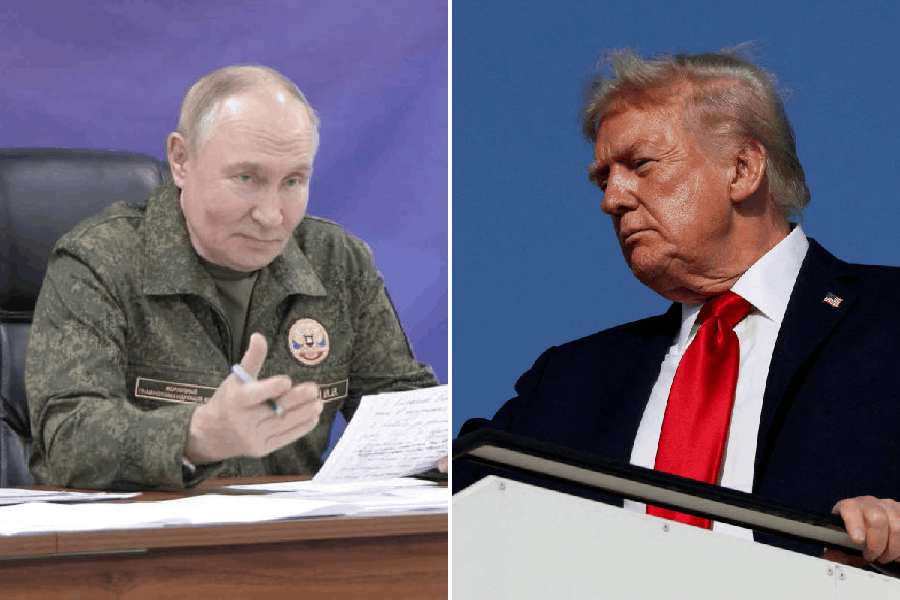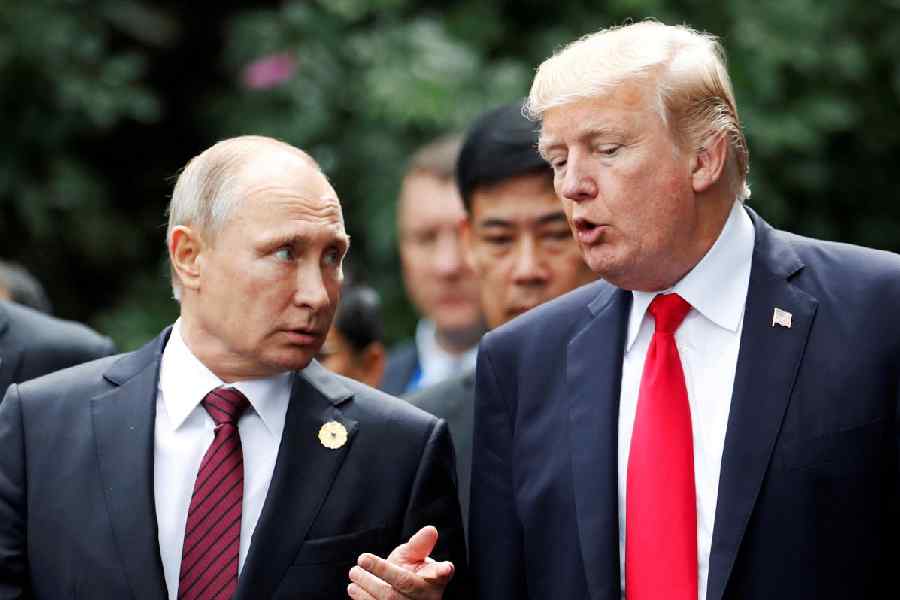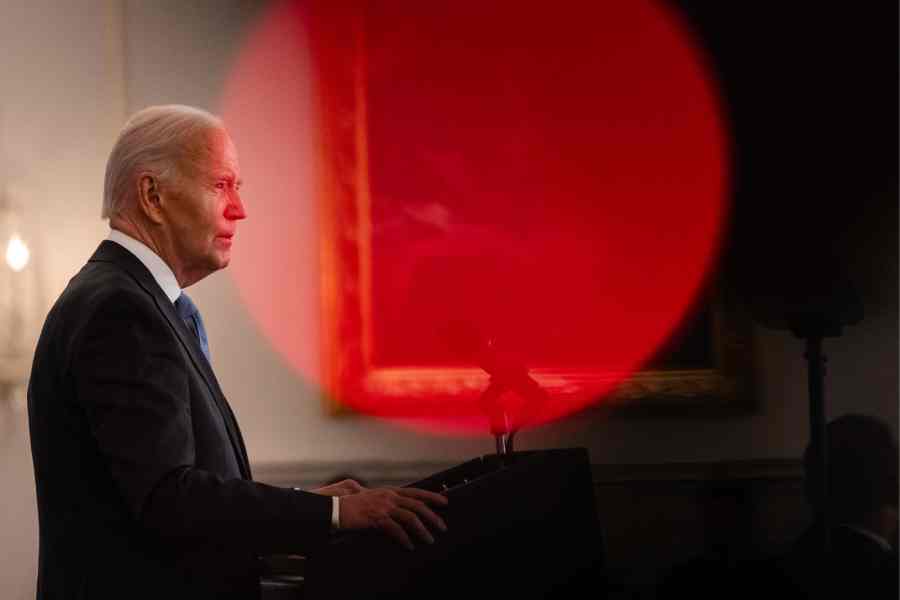United States President Donald Trump on Monday criticised Russian President Vladimir Putin’s announcement of a successful final test of the Burevestnik nuclear-powered missile, calling it “not appropriate” and urging Moscow to focus on ending the ongoing war in Ukraine instead.
“He ought to get the war (in Ukraine) ended. A war that should have taken one week is now in its fourth year. That’s what he ought to do instead of testing missiles,” Trump told reporters aboard Air Force One.
Footage released by the Kremlin on Sunday showed Putin in military fatigues receiving the report from Russian Army Chief of Staff Valery Gerasimov, who said the missile had remained airborne for about 15 hours and covered a distance of approximately 14,000 kilometres.
Asked on Air Force One about the test of the missile, dubbed the SSC-X-9 Skyfall by Nato, Trump said the United States did not need to fly so far as it had a nuclear submarine off the coast of Russia.
"They know we have a nuclear submarine, the greatest in the world, right off their shores, so I mean, it doesn't have to go 8,000 miles," Trump told reporters, according to an audio file posted by the White House.
The test was conducted on October 21.
Speaking about the test, Trump said: "We test missiles all the time."
"They're not playing games with us and we're not playing games with them either," Trump said.
The launch marked the latest chapter in Russia’s long-running development of the 9M730 Burevestnik, a cruise missile that Moscow has touted as a “strategic game-changer” capable of evading Western missile defences.
The International Institute for Strategic Studies (IISS), citing Russian military sources in 2021, estimated that the missile could have a theoretical range of up to 20,000 kilometres, enabling it to reach any target on the planet from within Russian territory.
A 2020 report by the US Air Force’s National Air and Space Intelligence Center suggested that once operational, the Burevestnik would provide Moscow with “a unique weapon with intercontinental-range capability.”
According to Gerasimov, the 9M730 Burevestnik operated on nuclear propulsion and demonstrated “high capabilities in evading anti-missile and anti-aircraft defences.”
The missile, both nuclear-powered and nuclear-armed, has been under development for years and was first announced by Putin in March 2018.
Unlike conventional cruise missiles that rely on standard fuel, the Burevestnik uses a miniature nuclear reactor to remain airborne for extended durations and cover intercontinental distances.
The Nuclear Threat Initiative (NTI), a US-based security think tank, stated in a 2019 report that the missile could “carry a nuclear warhead (or warheads), circle the globe at low altitude, avoid missile defences, and drop the warhead(s) at a difficult-to-predict location (or locations).”
The missile’s design reportedly allows it to fly at low altitudes — around 50 to 100 metres above the ground — making it difficult for radar systems to detect and for surface-to-air systems to intercept.
Russian military expert Alexei Leonkov told Reuters on Sunday that the missile’s role would be to destroy surviving enemy command centres, energy facilities, and industrial infrastructure after an initial exchange of nuclear strikes.
He said that once Russia’s intercontinental ballistic missiles had neutralised an adversary’s main defence systems, the Burevestniks would follow to “trample the aggressor countries into the Stone Age.”
Norway's military intelligence service said on Monday that Russia's test last week of its nuclear-powered Burevestnik long-range cruise missile was launched from the Barents Sea archipelago of Novaya Zemlya.
The test was accompanied by a large-scale nuclear forces drill and came at a time when Moscow’s relations with Washington are strained.
The Russian President said the test marked the completion of “crucial testing,” with the next steps involving classification of the system and the construction of necessary infrastructure for deployment.
The Burevestnik missile test comes amid tensions between Washington and Moscow that have already escalated over potential Tomahawk missiles to Ukraine and the cancellation of Trump-Putin summit, which was supposed to take place in Budapest.
On October 16, Putin warned Trump during a phone call that supplying Kyiv with Tomahawk cruise missiles “won’t change the situation on the battlefield, but would cause substantial damage to the relationship between our countries,” according to the Russian president’s foreign policy adviser, Yuri Ushakov.
A day later, when Ukrainian President Volodymyr Zelensky visited the White House, Trump appeared to downplay the possibility of providing the missiles. “We need Tomahawks for the United States of America too,” he said on October 17. “We have a lot of them, but we need them. I mean we can't deplete our country.”
On October 21, Donald Trump said he did not want a "wasted meeting" after a plan to have face-to-face talks with his Russian counterpart Vladimir Putin about the war in Ukraine was put on hold.
A White House official had said there were "no plans" for a Trump-Putin meeting "in the immediate future."
On October 23, Putin cautioned that if Ukraine were supplied with long-range weapons such as Tomahawks to strike targets deep inside Russia, Moscow’s response would be “overwhelming, stunning.”
The Kremlin has warned that any attack on Russian territory would invite a “very serious, if not overwhelming” response, a warning reiterated by presidential spokesman Dmitry Peskov on state television.
Putin said that while some Russian specialists had once doubted such a missile could ever be built, the success of the Burevestnik test had proved those doubts unfounded. He said Russia would now determine how to integrate the system into its strategic arsenal.












